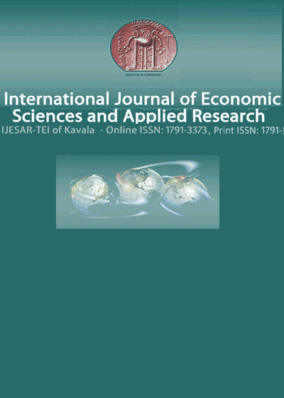Gender differences in life satisfaction and social participation
Part of : International journal of economic sciences and applied research ; Vol.6, No.3, 2013, pages 123-142
Issue:
Pages:
123-142
Author:
Abstract:
The paper deals with the effects of social participation activities on life satisfaction. Using the German General Social Survey (ALLBUS) for 2010, marginal effects of binary probit estimations on life satisfaction are presented. Strong gender differences are observable. While sport, welfare or parental activities affect only female life satisfaction, males are more affected by classical hobbies. As an interesting result that political activities, such as a political party or a union membership, have no or even negative effects. The general results may be interpreted in that way, that activities or memberships with influence in localfields with own responsibility and personal interest in a short of time, may be more satisfying than activities with more idealistic tasks and long run results, such as protecting nature or human rights.
Subject:
Subject (LC):
Keywords:
subjective well-being, social participation, German general social survey (ALLBUS)
Notes:
Περιέχει πίνακες και βιβλιογραφία
References (1):
- Aknin, L. B., Dunn, E. W. and Norton, Μ. I., 2012, ‘Happiness runs in a circular motion:Evidence from positive feedback loop between prosocial spending and happiness’,Journalof Happiness Studies, 13, 2, pp. 347-355.Aknin, L. B., Baringon-Leigh, C. P, Dunn, E. W., Helliwell, J. E, Biswas-Diener, R.,Kemeza, I., Nyende, P., Ashton-James, C. and Norton, Μ. I., 2013, ‘Prosocial spendingand well-being: Cross-cultural evidence for a psychological universal’, Journal ofPersonality and Social Psychology, 104, 4, pp. 635-652.Argyle, M., 1999, ‘Causes and correlates of happiness’, Kahneman, D., Diener, E, andSchwarz, N., Well-Being: The Foundations of Hedonic Psychology, Sage, New York,pp. 353-373.Barker, C. and Martin, B., 2011, ‘Participation: The happiness connection’, Journal ofPublic Deliberation, 7, 1, pp. 1-16.Becchetti, L., Pelloni, A. and Rossetti, F., 2008, ‘Relational goods, sociability, andhappiness’, Kyklos, 61, 3, pp. 343-363.Blanchflower, D. G., 2009, ‘International evidence on well-being1, Krueger, A. B.,Measuring the Subjective Well-Being of Nations: National Accounts of Time-Use andWell-Being, University of Chicago Press, Chicago, pp. 155-266.Downward, P. and Rasciute, S., 2011, ‘Does sport make you happy? An analysis of the wellbeing derived from sports participation4, International Review of Applied Economics,25,3,pp.331-348.Fitzenberger, B., Kohn, K. and Wang, Q., 2011, ‘The erosion of union membership inGermany: Determinants, densities, decompositions’, Journal of Population Economics,24, 1, pp. 141-165.Fleming, C. M. and Kler, R, 2008, ‘I'm too clever for this job: A bivariate probit analysison overeducation and job satisfaction in Australia’, Applied Economics, 40,9, pp. 1123-1138.Frey, B. and Stutzer, A., 2000, ‘Happiness prospers in democracy’, Journal of HappinessStudies, 1, 1, pp. 79-102.Gannon, B. and Roberts, J., 2012, ‘Social capital: Bridging the theory and empirical divide’,Sheffield Economic Research Paper Series 2012028.GESIS - Leibniz Institute for the Social Sciences, 2011, ‘ALLBUS/GGSS 2010 ’ (GermanGeneral Social Survey 2010). GESIS Data Archive, Cologne. ZA4610 data file version1.1.0.GESIS - Leibniz Institute for the Social Sciences, 2013, ‘ALLBUS/GGSS 2012 ’ (GermanGeneral Social Survey 2012). GESIS Data Archive, Cologne. ZA4614 data file version1.0.0.Heady, B.,Muffeld,R. and Wagner, G. G., 2010, ‘Long running German panel survey showsthat personnel and economic choices, not just genes, matter for happiness’, Proceedingsofthe National Academy of Sciences of the United States of America (PNAS), 107, 42,pp. 17922-17926.Howard, Μ. M. and Gilbert, L., 2008, ‘A cross-national comparison of the internal effectsofparticipation in voluntary organizations’, Political Studies, 56, 1, pp. 12-32.Humpert, S., 2010, ‘A note on happiness in Eastern Europe ’, European Research Studies,13, 3, pp. 133-144.Humpert, S., 2013, ‘A note on satisfaction with life, government and job: The case ofEastern Europe’, MPRA Paper 45449.Humpert, S. and Krüger, S., 2012, ‘Sind Gewerkschaftsmitglieder wirklich unzufriedener?Eine empirische Untersuchung’, Schöning, S., Richter, J. and Pape, A., Der Mittelstand:Forschungsansätze zur Sicherung der Zukunftsfähigkeit, Verlag Peter Lang, Frankfurta. M„ pp. 119-122.Kassenboehmer, S. C. and Haisken-DeNew, J P, 2009, ‘You're fired!The causal negativeeffect of entry unemployment on life satisfaction’, The Economic Journal, 119, 536, pp.448-462.Kroll, C., 2011, ‘Different things make different people happy: Examining social capitaland subjective well-being by gender and parental status’, Social Indicator Research,104, 1, pp. 157-177.Lelkes, O., 2010, ‘Social participation and social isolation ’, Atkinson A. B. and Marlier E.,Income and living conditions in Europe. Eurostat Statistical books, Publications Officeof the European Union Luxembourg, pp. 217-240.Lyubomirsky, S., Sheldon, K. M. and Schkade, D., 2005, ‘Pursuing happiness: Thearchitecture of sustainable change’, Review of General Psychology, 9, 2, pp. 111-131.Meier, S. and Stutzer, A., 2008, Ts volunteering rewarding in itself? ’, Economica, 75,297 ,pp. 39-59.NPO, 2011, ‘Vereinsstatistik 201Γ, http://www.npo-info.de/vereinsstatistik/2011/(accessed 7/8/2013).Phillips, D. L., 1967, ‘Social participation and happiness’, American Journal of Sociology,72, 5, pp. 479-488.Rasciute, S. and Downward, R, 2010, ‘Health or happiness? What is the impact of physicalactivity on the individual? ’, Kyklos, 63, 2, pp. 256-270.Rodriguez-Pose, A. and von Berlepsch, V., 2013, ‘Social capital and individual happiness’,Journalof Happiness Studies, forthcoming.Scarrow, S. E., 1994, ‘The “paradox of enrollment ”: Assessing the costs and benefits ofparty memberships’, European Journal of Political Research, 25, 1, pp. 41-60.Statistisches Bundesamt, 2012, ‘Statistisches Jahrbuch Deutschland und Internationales2012’, Statistisches Bundesamt, Wiesbaden.Van Bietzen, I., Mair, P. and Poguntke, T., 2012, ‘Going, going, ... gone? The decline ofparty membership in contemporary Europe’, European Journal of Political Research51, 1, pp. 24-56.Widjaja, E., 2010, ‘Motivation behind volunteerism ’, CMC Senior Theses, Paper 4Yamamura, E., 2013, ‘Natural disasters and participation in volunteer activities: A casestudy of the great Hanshin-Awaji earthquake’, Annals of Public and CooperativeEconomics, 84, 1, pp. 103-117.




